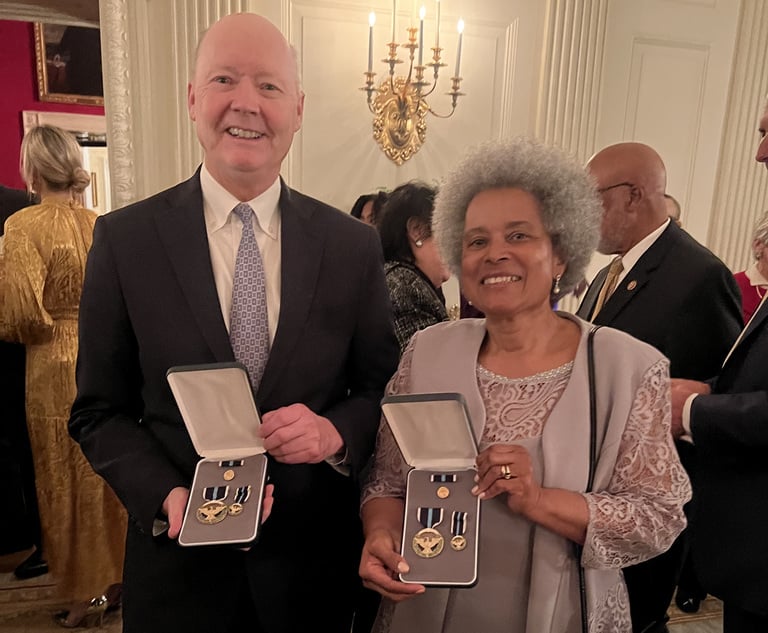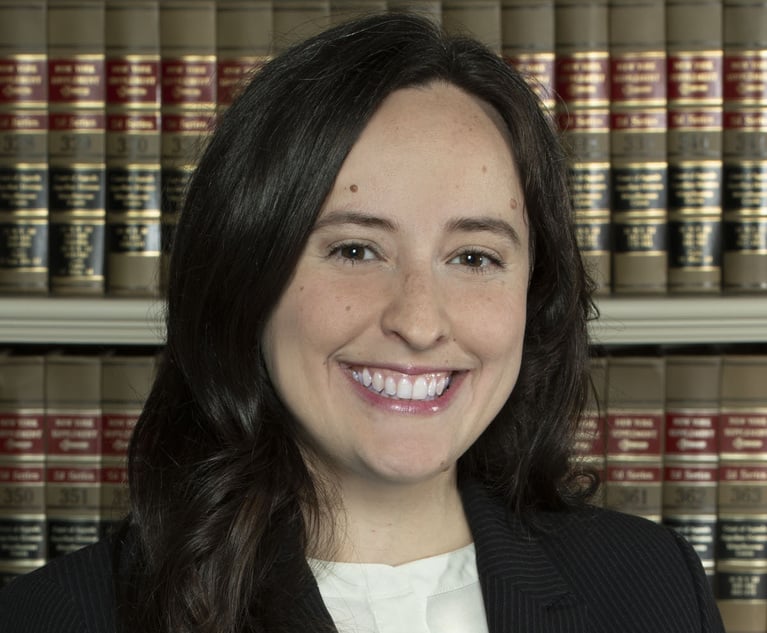 Allergan headquarters in Irvine. Photo: Wikimedia Commons
Allergan headquarters in Irvine. Photo: Wikimedia Commons Federal Judge Approves $9M Settlement in Allergan 'Product-Hopping' Suit
A federal judge in Delaware gave final approval Tuesday to a $9 million class-action settlement in Hartig Drug Co.'s antitrust suit against Allergan, after an appeals court in 2016 revived claims that Allergan had tried to suppress generic versions of its eye-care products.
November 13, 2018 at 04:28 PM
3 minute read
A federal judge in Delaware gave final approval Tuesday to a $9 million class-action settlement in Hartig Drug Co.'s antitrust suit against Allergan, after an appeals court in 2016 revived claims that Allergan had tried to suppress generic versions of its eye-care products.
The ruling, from U.S. District Senior Judge Joseph F. Bataillon of the District of Delaware, brought an end to nearly four and a half years of litigation in the product-hopping case, which had been closely watched by the pharmaceutical industry.
In February, Allergan, Senju Pharmaceutical Co. and Kyorin Pharmaceutical Co. agreed to pay $9 million to a class of consumers and other purchasers who bought Zymar or Zymaxid eye drops between June 2010 and December 2017. In return, all related claims against Allergan and its co-defendants would be released with prejudice, according to court documents.
“The settlement falls well within the range of reasonableness,” Bataillon said Tuesday in a four-page order. “The settlement does not unreasonably favor plaintiff or any segment of the settlement class.”
Hartig, an indirect purchaser that bought the drugs from AmerisourceBergen, sued in 2014, alleging that Allergan had conspired to muscle planned generics out of the market and sell its eye drops at an inflated price. Former U.S. District Judge Sue L. Robinson dismissed the suit for lack of jurisdiction, but Hartig appealed to the U.S. Court of Appeals for the Third Circuit in 2015.
On appeal, the case was seen as potentially precedent-setting, and some of the country's top pharmaceutical companies worried that it could upset the common practice whereby drug wholesalers assign antitrust claims downstream to pharmacies to bring anti-competitive lawsuits, rather than the pharmaceutical companies themselves suing the sellers they purchase from.
Several pharmacies and drug chains aligned themselves with Hartig, filing an amicus brief in which they argued an adverse ruling could disrupt the way they do business.
Ultimately, a three-judge panel of the appeals court agreed that Allergan had established a “judicially redressable” injury, and found that Robinson, who retired in 2017, had improperly tossed the case for lack of subject-matter jurisdiction. The ruling vacated Robinson's dismissal and remanded the case for further proceedings.
After engaging in extensive negotiations before mediator David A. Rotman, the parties emerged with a settlement agreement, which received preliminary approval in late February. Bataillon conducted a fairness hearing Nov. 9.
“The settlement was the result of the parties' good-faith negotiations. The settlement was entered into by experienced counsel and only after extensive arm's-length negotiations and was only achieved after the involvement of an experienced mediator,” Bataillon wrote Tuesday.
Hartig's attorneys have asked for $3 million in attorney fees for litigating the case.
Hartig was represented by Brent W. Landau and Melinda R. Coolidge of Hausfeld in Philadelphia and New York and Gregory A. Frank and Marvin L. Frank of Frank in New York. J. Clayton Athey and Eric J. Juray of Prickett, Jones & Elliott acted as local counsel in the case.
Allergan was represented by M. Sean Royall, Ashley E. Johnson and Jason C. McKenney of Gibson, Dunn & Crutcher in Washington, D.C., and Jack B. Blumenfeld of Morris, Nichols, Arsht & Tunnell.
The case was captioned Hartig Drug v. Senju Pharmaceutical.
This content has been archived. It is available through our partners, LexisNexis® and Bloomberg Law.
To view this content, please continue to their sites.
Not a Lexis Subscriber?
Subscribe Now
Not a Bloomberg Law Subscriber?
Subscribe Now
NOT FOR REPRINT
© 2025 ALM Global, LLC, All Rights Reserved. Request academic re-use from www.copyright.com. All other uses, submit a request to [email protected]. For more information visit Asset & Logo Licensing.
You Might Like
View All
Fed Judiciary Panel Mulls Authority to Ban In-State Bar Admission Requirements

Delaware Legal Figures Who Played Key Roles in Ending School Segregation Honored With Presidential Citizens Medal
3 minute read

Trending Stories
Who Got The Work
Michael G. Bongiorno, Andrew Scott Dulberg and Elizabeth E. Driscoll from Wilmer Cutler Pickering Hale and Dorr have stepped in to represent Symbotic Inc., an A.I.-enabled technology platform that focuses on increasing supply chain efficiency, and other defendants in a pending shareholder derivative lawsuit. The case, filed Oct. 2 in Massachusetts District Court by the Brown Law Firm on behalf of Stephen Austen, accuses certain officers and directors of misleading investors in regard to Symbotic's potential for margin growth by failing to disclose that the company was not equipped to timely deploy its systems or manage expenses through project delays. The case, assigned to U.S. District Judge Nathaniel M. Gorton, is 1:24-cv-12522, Austen v. Cohen et al.
Who Got The Work
Edmund Polubinski and Marie Killmond of Davis Polk & Wardwell have entered appearances for data platform software development company MongoDB and other defendants in a pending shareholder derivative lawsuit. The action, filed Oct. 7 in New York Southern District Court by the Brown Law Firm, accuses the company's directors and/or officers of falsely expressing confidence in the company’s restructuring of its sales incentive plan and downplaying the severity of decreases in its upfront commitments. The case is 1:24-cv-07594, Roy v. Ittycheria et al.
Who Got The Work
Amy O. Bruchs and Kurt F. Ellison of Michael Best & Friedrich have entered appearances for Epic Systems Corp. in a pending employment discrimination lawsuit. The suit was filed Sept. 7 in Wisconsin Western District Court by Levine Eisberner LLC and Siri & Glimstad on behalf of a project manager who claims that he was wrongfully terminated after applying for a religious exemption to the defendant's COVID-19 vaccine mandate. The case, assigned to U.S. Magistrate Judge Anita Marie Boor, is 3:24-cv-00630, Secker, Nathan v. Epic Systems Corporation.
Who Got The Work
David X. Sullivan, Thomas J. Finn and Gregory A. Hall from McCarter & English have entered appearances for Sunrun Installation Services in a pending civil rights lawsuit. The complaint was filed Sept. 4 in Connecticut District Court by attorney Robert M. Berke on behalf of former employee George Edward Steins, who was arrested and charged with employing an unregistered home improvement salesperson. The complaint alleges that had Sunrun informed the Connecticut Department of Consumer Protection that the plaintiff's employment had ended in 2017 and that he no longer held Sunrun's home improvement contractor license, he would not have been hit with charges, which were dismissed in May 2024. The case, assigned to U.S. District Judge Jeffrey A. Meyer, is 3:24-cv-01423, Steins v. Sunrun, Inc. et al.
Who Got The Work
Greenberg Traurig shareholder Joshua L. Raskin has entered an appearance for boohoo.com UK Ltd. in a pending patent infringement lawsuit. The suit, filed Sept. 3 in Texas Eastern District Court by Rozier Hardt McDonough on behalf of Alto Dynamics, asserts five patents related to an online shopping platform. The case, assigned to U.S. District Judge Rodney Gilstrap, is 2:24-cv-00719, Alto Dynamics, LLC v. boohoo.com UK Limited.
Featured Firms
Law Offices of Gary Martin Hays & Associates, P.C.
(470) 294-1674
Law Offices of Mark E. Salomone
(857) 444-6468
Smith & Hassler
(713) 739-1250






